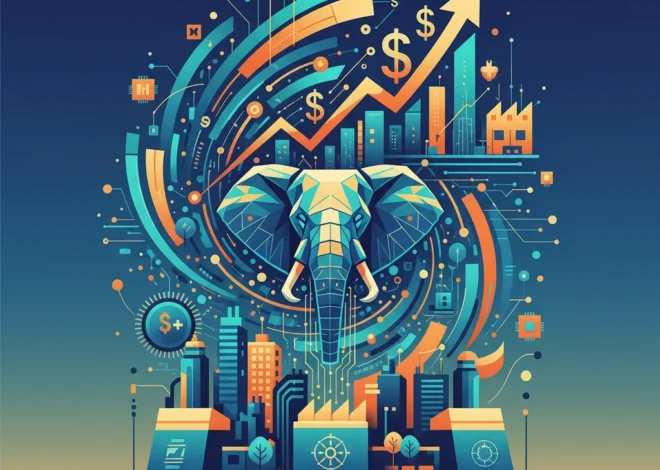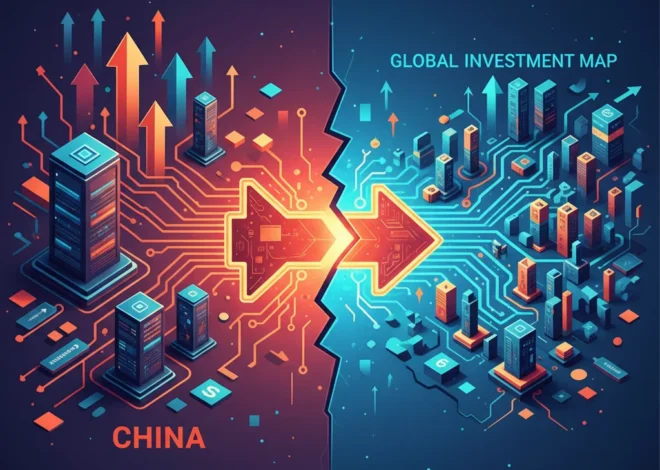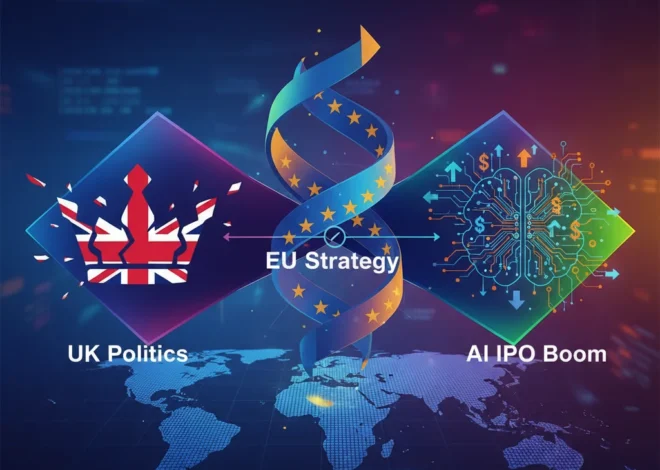
Nvidia’s Trillion-Dollar Handshake: Decoding the AI Megadeals with Asia’s Tech Titans
The AI Engine of the World Deepens Its Roots in Asia
In the fast-paced world of technology and finance, few stories are as compelling as Nvidia’s meteoric rise. Having recently shattered a $3 trillion market valuation, the chipmaker has become more than just a company; it’s a foundational pillar of the modern global economy. Fresh off this incredible milestone, Nvidia is not resting on its laurels. The company has just announced a series of strategic deals with a trio of South Korea’s most formidable technology giants: LG, Hyundai, and Samsung. These are not just sales agreements; they are deep-seated partnerships that will shape the future of everything from our cars to our homes and the very fabric of our digital lives.
This move signals a significant deepening of Nvidia’s influence, extending its dominance from the data center to the consumer’s doorstep. For investors, business leaders, and anyone interested in the future of the stock market and the global economy, understanding the nuances of these deals is critical. We’ll explore the specifics of each partnership, analyze the profound implications for the financial world, and offer an expert perspective on why these handshakes across the Pacific are a watershed moment for the AI revolution.
Forging Alliances: A Strategic Breakdown of the Deals
Nvidia’s strategy is clear: embed its technology so deeply into the world’s leading industries that it becomes the indispensable “operating system” for artificial intelligence. The partnerships with LG, Hyundai, and Samsung are a masterclass in executing this vision, targeting three distinct but interconnected pillars of the modern economy: consumer electronics, automotive, and the core semiconductor supply chain.
According to a report from the BBC, these bumper deals underscore the insatiable demand for Nvidia’s processing power. Let’s examine what each collaboration entails.
The following table provides a high-level overview of these strategic alliances:
| Partner Company | Primary Focus Area | Strategic Implication for Nvidia |
|---|---|---|
| Hyundai | Automotive AI & Robotics | Solidifies Nvidia’s DRIVE platform as the brain for next-gen vehicles and smart factories, a massive growth sector. |
| LG | Consumer Electronics & “Ambient Computing” | Expands Nvidia’s reach into the smart home and AI-powered appliances, moving beyond the PC and data center. |
| Samsung | Advanced Computing & HBM Memory | Strengthens a crucial supply chain relationship for High Bandwidth Memory (HBM) while also supplying chips for Samsung’s own AI ambitions. |
Hyundai: Powering the Future of Mobility
The automotive industry is undergoing a transformation not seen since the invention of the assembly line. The modern car is a computer on wheels, and at the heart of its most advanced features—from autonomous driving to a truly intelligent in-car experience—is AI. Hyundai’s decision to deepen its partnership with Nvidia is a massive vote of confidence in the latter’s DRIVE platform. This collaboration will likely focus on developing sophisticated AI systems for autonomous navigation, predictive maintenance, and creating a seamless, voice-activated cockpit that anticipates the driver’s needs. This move is a critical play in the high-stakes game of automotive technology, impacting everything from manufacturing economics to consumer safety.
Beyond the Shopping Cart: What Gold, Tech, and a Sunny Summer Tell Us About the Real Economy
LG: Weaving AI into the Fabric of Daily Life
While less flashy than self-driving cars, the smart home market represents a vast and largely untapped frontier for high-level AI. LG, a global leader in home appliances and consumer electronics, is partnering with Nvidia to bring “ambient computing” to life. Imagine a home where your television, refrigerator, and washing machine not only communicate with each other but also learn your habits and proactively manage your environment. This requires immense on-device processing power, which is where Nvidia’s chips come in. This deal could accelerate the development of genuinely smart homes, creating a new ecosystem of AI-driven services and further embedding advanced technology into our daily routines.
Samsung: The Competitor, Customer, and Collaborator
The relationship with Samsung is the most multifaceted and, arguably, the most important. Samsung is a unique entity in this trio:
- A Customer: Samsung Electronics will integrate Nvidia’s GPUs into its own range of products, from laptops to potentially new AI-focused devices.
- A Critical Supplier: Samsung is one of the world’s only manufacturers of High Bandwidth Memory (HBM), a type of super-fast RAM that is essential for high-performance AI chips like Nvidia’s H100 and B200. Strengthening this supply relationship is paramount for Nvidia to meet explosive demand.
- A Potential Competitor: Samsung’s semiconductor division is also developing its own AI accelerators. However, this deal suggests a pragmatic approach, where collaboration in key areas outweighs direct competition for now.
This complex dynamic highlights the intricate web of dependencies that defines the modern financial technology and semiconductor landscape. This partnership is a masterstroke in supply chain management and strategic co-opetition.
The Trillion-Dollar Ripple: What This Means for Investing, Finance, and the Economy
When a company of Nvidia’s scale makes such decisive moves, the shockwaves are felt across the entire financial ecosystem. The implications extend far beyond the stock prices of the four companies involved, touching on broad sectors of the economy, from banking and fintech to global trade.
Impact on the Stock Market and Technology Investing
For investors, these deals reinforce Nvidia’s dominant market position. The company is not just a supplier but a core partner, reducing the risk of clients switching to a competitor. This news further solidifies the investment thesis that Nvidia is a key long-term holding for exposure to the AI boom. The effect on the **stock market** is twofold: it provides a direct catalyst for NVDA and its partners, and it serves as a bellwether for the health of the entire technology sector. A strong Nvidia signals continued investment and growth in AI, which buoys related stocks in software, cloud computing, and data infrastructure. Prudent **investing** in this space now requires a deep understanding of the semiconductor supply chain, as partnerships like these can dictate market leadership for years.
The advanced computational power being deployed also has profound implications for the world of **trading** and **financial technology**. The same GPUs that will power self-driving cars are used by hedge funds and investment banks to run complex algorithms for high-frequency trading and risk modeling. As AI hardware becomes more powerful and widespread, the pace of innovation in **fintech** will only accelerate.
Beyond the Trillion-Pound Ledger: Why Afua Kyei's Powerlist Triumph Signals a New Era in Finance
Fueling the Next Wave of Economic Growth
From a macroeconomic perspective, these partnerships are a powerful engine for productivity. The integration of AI into manufacturing (Hyundai), consumer goods (LG), and core technology (Samsung) promises to unlock new efficiencies and create entirely new markets. This is a textbook example of how technological advancement drives the broader **economy**. The development of a robust AI ecosystem stimulates job creation in new fields, enhances the capabilities of existing industries like **banking** and logistics, and ultimately contributes to GDP growth. The **economics** of AI are no longer theoretical; they are being written in real-time through deals like these, with a recent analysis by PwC suggesting AI could contribute up to $15.7 trillion to the global economy by 2030.
The Future of Fintech and Blockchain
While not a direct focus of these specific deals, the underlying technology has massive implications for the future of finance. The immense parallel processing capabilities of Nvidia’s GPUs are essential for training the AI models that power modern fraud detection, personalized banking services, and automated financial advisors. Furthermore, the computational intensity of technologies like **blockchain** relies on powerful hardware. As Nvidia continues to push the boundaries of performance, it indirectly enables more secure, scalable, and complex decentralized financial systems to be built.
Sunshine and Spending: Is the UK's Record Retail Surge a Turning Point for the Economy?
Conclusion: More Than a Deal, It’s a Declaration
Nvidia’s strategic partnerships with LG, Hyundai, and Samsung are far more than a simple sales announcement. They are a declaration of intent. It is the architectural blueprint for an AI-powered future, where Nvidia’s technology serves as the central nervous system for our most critical industries. By securing these alliances, Nvidia has not only expanded its market but has also woven itself into the very fabric of its partners’ long-term strategies, creating a powerful and resilient ecosystem.
For those navigating the complexities of modern **finance** and **investing**, the message is clear: the AI revolution is not a distant event on the horizon; it is here, and it is being built on a foundation of silicon. These deals demonstrate that the companies that will win in the next decade are not just those who create the technology, but those who can forge the strategic partnerships to deploy it at a global scale. Nvidia has once again proven it excels at both.


